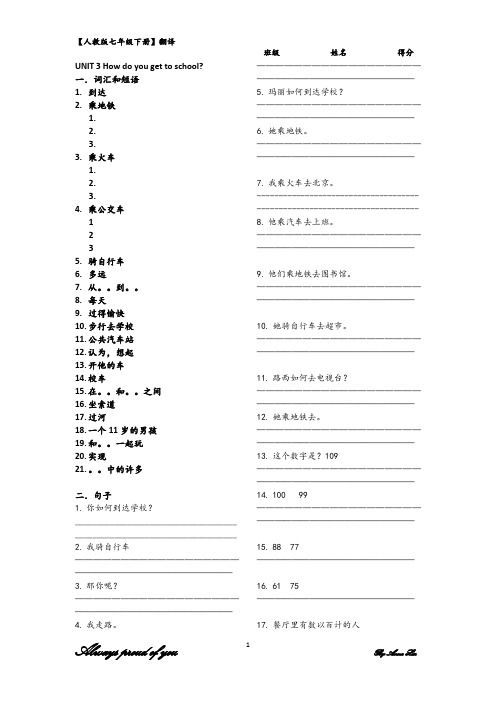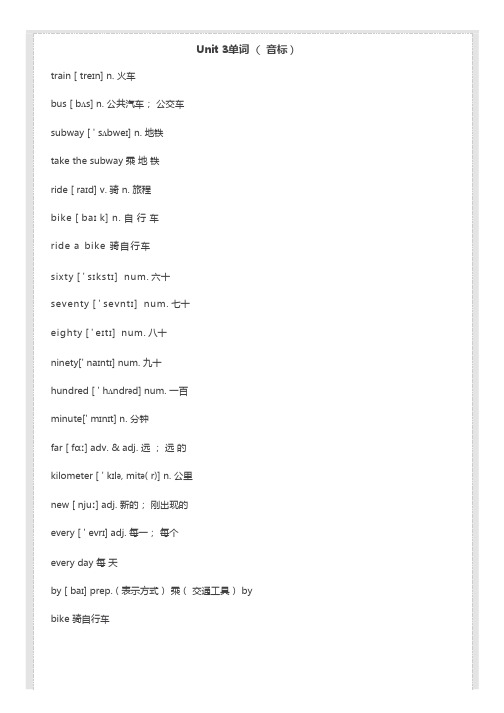人教版新目标英语七年级下册Unit3复习
人教版新目标七年级下册UNIT3翻译练习考前复习

UNIT 3 How do you get to school?一.词汇和短语1.到达2.乘地铁1.2.3.3.乘火车1.2.3.4.乘公交车1235.骑自行车6.多远7.从。
到。
8.每天9.过得愉快10.步行去学校11.公共汽车站12.认为,想起13.开他的车14.校车15.在。
和。
之间16.坐索道17.过河18.一个11岁的男孩19.和。
一起玩20.实现21.。
中的许多二.句子1.你如何到达学校?_____________________________________ _____________________________________ 2.我骑自行车————————————————————————————————————3.那你呢?————————————————————————————————————4.我走路。
————————————————————————————————————5.玛丽如何到达学校?————————————————————————————————————6.她乘地铁。
————————————————————————————————————7.我乘火车去北京。
-------------------------------------------------------------------------- 8.他乘汽车去上班。
————————————————————————————————————9.他们乘地铁去图书馆。
————————————————————————————————————10.她骑自行车去超市。
————————————————————————————————————11.路西如何去电视台?————————————————————————————————————12.她乘地铁去。
————————————————————————————————————13.这个数字是?109 ————————————————————————————————————14.100 99 ————————————————————————————————————15.88 77 ——————————————————16.61 75 ——————————————————17.餐厅里有数以百计的人————————————————————————————————————18.你每天什么时候到家?————————————————————————————————————19.他们将在今晚九点到达北京。
人教版(新目标)初中英语七年级下册Unit 3预习自学

drive [ draɪv] v. 开车car [ kɑː]n. 小汽车;轿车l ive[ l ɪv]v. 居住;生活stop [ stɑ: p][ stɒp] n. 车站; v. 停止think of 认为cross [ krɒs] v. 横过;越过river [ ' rɪvə] n. 河;江many [ ' menɪ] adj. & pron. 许多village [ ' vɪlɪdʒ] n. 村庄;村镇between [ bɪ' twiːn] prep. 介于…之间between… and…在……和……之间bridge [ brɪdʒ] n. 桥boat [ bəʊt] n. 小船ropeway [ ' rəʊpweɪ]n. 索道year [ j ɪə][jɜː]n. 年;岁afraid [ ə' freɪd]adj. 害怕;惧怕l ike [ laɪk]prep. 像;leave [ l iːv]v. 离开dream [ driːm] n. 梦想;睡梦 v. 做梦true [ truː] adj. 真的;符合事实的come true实现;成为现实Dave[ deiv]戴夫(男名)••••• • • • •••• H ow do you get to schoolsHow d o y ou get to s chool? How d oes she g et t o t ooI7 I ride my bike, ”" ../:’yShe usually takes the WHow l ong d oes”it téke t o g et t o school7 It takes about 1S min’utes.Does Jane walk to sdiool? No. she doesn t. Sf›e.go4s:by bike.0o they take the bus to school? Ha, they don*t) III1. How does Mike get to school* a. Yes. they do.2. How long does it take to get home? b. No, he doem't..3. How far is it from here? c. He rides hts bike.4. Do your friends go to schonl by bus? d. Its five kilometers.5. D•e -s your dad drive his car to wnrk!' e. Akout I S m inutes.t. school / you / get to / do / bow2. to / xcltool / get to / door / huw long / taLc / it4.you/ to/ walL / do / schoolS- ride / Lheir bike / no / sc?fool / your kic=ds / t• "lives about Fwe kilometers from school.walk$ io srhool.makes a bus to school.goes to school by bike.needs about an hour to get to school.needs ahou\ t0 minutes to get to school.Hew far it from yota- home fa schoollTett youz paztoer bowyoo get to ecfzool. Imagtzze you uae two types obtzanapoztaöon.A: How do yc•u get to school ?B: Well, I ride rriy bike tti the subway station. ’Fiien I take the subway.Listen and check (w'•) the things ttiat h4ary wants io know.Mary wants to know ..,wlierv• Bob lives.how far he lives from his grandparents' latrine.how he gets to hix grandparents’ home.how long it takes to Act to his grandparents’ home.what he thinks of the trip.Listen agaim. How docs Bob get tes his grandpnrents’ home ? Check (w )1 or z. › . - - ' ß-k- - ws-&Ma2cb ibe woras w›c› tJae ptmuxea.e e e + + • • r • e • e •/@gn d Q$j \Q r)/r e r r•r a r r•o e e • • r e e r e •• e • • •e e / • r••• •xkook p2 the ptctuze aod ttMc betow. Gaess wknt cke paaeage ia akoot•Crossing the River to SchoolHow do you get to school? Do you walk orride a bike? Du you go by bus nr by train? Formany students, it is easy to get to school. Butfor the students in one sma!l village in Chinn,it is difficult The s r e is very big river betweentheir school and the village. there is no bridgeand the river runs too quickly (or boats. SoGcscztudcntsgoonaropewaytocrossthcriver to school.One 11 year-old boy, Liangliang, crosses theriver every school day. But he is not afraid. ‘I love to play with my cram.smates.Artd ) lovc my tmchcr. ) (cs )ikc a fath42r tO mWMany of the students ant) villagers never leave the villn lt is their dreamter love a bridge. Can their dream coiiie true:I.HC›tV dU t hc S1tt€)€*E3£k il? t hc YINI @t›tt›1€Ic›l•2.Wit}' do Lh go to sChcol lilce this*3.Uoes the boy like Izts school? Why*4.¥S’kat i; thc villagers' tJrcanl? l1n you think tJlcir chin c ancome true? Whyur why nut?Read tbe passage agn£a. Cozoplete the sentences with wozde frozn tbe1.For die students in the v itkige, it is to get to school.2.They have to cross a very river between their scboo! a nd the village..3. They cannot go by boat Esc thc river r 1xs t oo4. It is n ot easy to cross the river on a ropeway, but the boy is n ot.$. the studnnis and villagers want to have a bridge. Can their dream comeUnit3 知识梳理◆短语归纳1.get to school 到达学校2.take the subway 乘地铁3.ride a bike 骑自行车4.how far 多远5.from home to school 从家到学校6.every day 每天7.take the bus 乘公共汽车8.by bike 骑自行车9.bus stop 公共汽车站10.think of 认为11.between…and…在…和…之间12.one 11-year-old boy 一个11岁的男孩 13.play with…和…玩e true 实现15.have to 不得不◆用法集萃1.take…to…= go to…by…乘…去…2.How do/does sb get to…? 某人是怎样到…的?3.How far is it from…to…? 从…到…有多远?4.It takes sb. some time to do sth. 做某事花费某人多长时间。
新目标英语新版教材七年级下总复习Unit3-Unit_4_测试题

Unit3---Unit4一、根据首字母或汉语提示完成句子:1.--- D_____________ eat in classroom. --- S____________, Ms. Clark.2.I’m s______________, I a_________________ late for school.3.--- Can we bring music players to school? ---- No, you c_________.4.---He always w______________ a uniform at school? --- No, he d___________.5.I r___________ to school, because can’t be l______________ for school.6There many _____________ (规章制度) at school.Andthey’revery___________(重要).7.Can I go ________________(在---前)class or ______________(在---后) class?8.It’s too ________________(脏) and _________________(吵闹) in that classroom.9._________________(记住) to ________________(休息) for an hour.10._______________(跟随) me, you can ___________(学会) it well.二、单项选择:ually they _________ rules, and we must follow ________.A. make, itB. make, themC. makes, it D makes, them2. --- _________ in the hallways. --- Sorry, sir.A. Not runB. Don’t runC. Not runningD. Don’t running3. ---Does he like _____________ music? --- Yes, he does.A. listening toB. listen toC. listenD. listening4. We _____________ in the classroom.A. have to quietB. have quietC. have to be quietD. have quiet to5. Don’t ________ and don’t _________ in class.A. eat, noiseB. to eat, noisyC. to eat, noiseD. eat, noisy6. I am not happy because there are _________ rules and _________ homework at home.A. too many, too muchB. too much, too many+C. too many, too many D. too much, too much7. I think it’s best _____________ for Tom.A. relaxB. to relaxC. relaxingD. relaxes8. She ____________ school every day.A. doesn’t have to comeB. doesn’t has to comeC. doesn’t have to come toD. doesn’t has to come to9. Molly can’t play soccer on school days, but she _________ play it on weekends.A. canB. can’tC. mustD. has to10. Schools make rules ___________ us students, we must follow _______.A. help, theyB. to help, themC. help, them D to help, they三、句型变换1. The boy has to get up early every morning. ( 一般疑问句)___________ the boy ___________ __________get up early every morning?2. I can sing and dance, too. ( 否定句)I __________ sing _______ dance, _____________.3. You can’t come late for school. ( 改为祈使句)_________ _________ late for school.4. She has no sister. ( 同义句)She____________ _________________________ sister.5 I have to get up early and do my homework. ( 划线提问)___________ __________ you _________ to do?四、用括号内单词的正确形式填空:1.There’s too much _____________(noise) in the room, it’s too ____________(noise).2.She ________________(do) the __________________(dish) every day.3.There are too many ___________(rule) at school, some of them ________(be) strict.4.He often __________(feel) tied because he often _________(relax) six hours a day.5.He has to ______________(help) his mother________________(do) the housework.五、根据汉语提示,用英语词组完成句子。
新目标七年级英语下学期复习unit 3ppt课件演示文稿

懒的 lazy
睡觉 sleep 草 grass
盒子 box
beautiful
非洲 丑陋的 Africa ugly shy other
机灵的 友好的 clever friendly 在…期间 during源自美丽的 害羞的另外的
稍许 kind of 保持安静 be quiet 在夜里 at night
谈论 talk about 起床 get up
5.Is your brother good at ______? D
A. sing B. to sing
A. by, by B. on, on
C. sings
C. by, on
D. singing
D. on, by
6. Do you usually go to work ____foot or _____bike? D 7. There is ___elephant in the zoo. _____elephant is big. B A. /, An B. an, The C. a, The D. an, / 8.Listen! The boy _____in the room. He often _____songs. B A. singing, sings B. is singing, sings C. sings, sings D. sings, is singing 9. My little cat sleeps ____the day, but ___night he works. D A. at, at B. on, in C. on, at D. during, at
Unit 3
老虎 tiger 大象 elephant 可爱的 cute 海豚 dolphin 狮子 lion 长颈鹿 giraffe 树袋熊 koala 肉 meat
人教版(新目标)初中英语七年级下册Unit 3

人教版(新目标)初中英语七年级下册Unit3Unit3 How do you get to school?Unit3 知识梳理◆短语归纳1. get to school 到达学校2. take the subway 乘地铁3. ride a bike 骑自行车4. how far 多远5. from home to school 从家到学校6. every day 每天7. take the bus 乘公共汽车8. by bike 骑自行车9. bus stop 公共汽车站10. think of 认为11. betweenand 在和之间12. one 11-year-old boy 一个11岁的男孩 13.play with 和玩14. come true 实现15. have to 不得不◆用法集萃1. taketo= go toby 乘去2. How do/does sb get to? 某人是怎样到的?3. How far is it fromto? 从到有多远?4. It takes sb. some time to do sth. 做某事花费某人多长时间。
5. How long does it take to do sth.? 花费多长时间?6. It is + adj. + to do sth. 做某事是7. Thanks for + n./Ving 感谢你(做)某事。
◆典句必背1. How do you get to school? 你怎么去上学?I ride my bike. 我骑自行车。
2. How far is it from your home to school? 从你家到学校有多远?3. How long does it take you to get to school? 去上学花费你多久?4. For many students, it is easy to get to school. 对很多学生来说,很容易到达学校。
新目标英语七年级(下)Unit_3知识要点归纳

知【重点词汇】train火车subway 地铁ride 骑旅程minute 分钟far &远;远的kilometer千米;公里new 新的;刚出现的drive 开车live 生活;居住stop 车站停止cross 横过;越过afraid 害怕的;畏惧的leave 离开dream 梦想;睡梦true 真的;符合事实的bridge 桥take the subway 乘地铁ride a bike 骑自行车how far 多远how long 多长时间walk to school 步行去上学get to school 到校by bus 乘公汽by bike 骑自行车by train 乘坐火车by boat 乘坐小船cross the river 过河come true 实现;成为现实【重难点句子】1.It takes sb.some time to do sth.花费某人一段时间去做某事例如:It takes me twenty minutes to get to school on foot every morning.我每天早上花20分钟步行到学校。
☆take 还有“乘;坐”之意例如:Shall we go by bus or take a cab?我们是乘公共汽车去还是乘出租去?2.The bus ride is never boring because I always talk to my classmates.坐公交车从不会无聊,因为我总是跟同学们聊天。
在这句话中ride 是名词,表示“行程”。
How 引导的特殊疑问句3.用How do you...?询问别人做某事的方式。
回答可以用by sth.或take sth.的结构。
4.How far 引导的特殊疑问句用来询问两地之间的距离。
34Copyright ©博看网. All Rights Reserved.。
Unit+3+单元复习 人教版七年级英语下册

Exercises
根据首字母提示填空。
1. You can go to the bus s _to__p_/_s_ta__ti_o_n__to wait for the bus. 2. Henry is 24, so he doesn’t want to l___iv_e____with his parents.3. Alice always l___e_a_v_e_s__ home at 7:00 in the morning.4. You can see many b________ oonathtsis river, and some of them are very big.5. He r_______ his bike to school every morning.
transportation
train bus subway bike plane taxi boat ...
means of transportation
take the train/by train take the bus/by bus take the subway/by subway ride a bike/by bike take the plane/by plane take the taxi/by taxi take the boat/by boat ...
7:00 a.m.
7:15 a.m.
It _t_a_k_e_s_ about 1_5__m_i_n_u_t_e_s_.
How far is it from your home to school? 2 kilometers
__I_t __ __i_s__ only about _t_w_o_k__il_o_m_e_t_e_r_s.
Unit 3--4 课件人教新目标七年级英语下册单元基础知识复习

重点短语
根据汉语意思,写出相应的英文短语 1. 坐火车 _ta_k_e__th_e__t_ra_i_n_/b_y__t_ra_i_n_ 2. 坐公交车 _t_a_k_e_t_h_e__b_u_s_/b_y__b_u_s__ 3. 坐地铁 _ta_k_e__th_e__s_u_b_w__a_y_/b_y__s_u_b_w_a_y__ 4. 骑自行车__r_id_e__a_b__ik_e_/_b_y_b_i_k_e__ 5. 每天_____e_v_e_ry__d_a_y____ 6. 到校____g_e_t _to__s_c_h_o_o_l__
5.Lily is ___n_e_w___ (新的)in our class. Let's tell her some of our class rules. 6.There is a lake in the center of the park and we can take a ___b_o_a_t__ (船) there. 7.Some of them take the _s_u_b__w_a_y_ (地铁) to school. 8.My grandpa likes to ___l_iv_e___ (居住) in the village. He doesn't want to move to the city. 9.The old man is 90 __y_e_a_r_s__ (岁) old, but he can walk well and speak clearly. 10.Don't __l_e_a_v_e__ (离开) the club before four o'clock in the afternoon.
17.开车(v.) ___d_r_iv_e__ →(名词)司机 __d_r_iv_e_r__ 18.横过;越过(v.)___c_ro_s_s__ →(介词)__a_c_r_o_s_s_ 19.离开;留下(v.)___le_a_v_e__ →(过去式)___l_e_f_t __ 20.真的;符合事实的(adj.)___t_ru_e___ →(副词)___t_ru_l_y__ →(名词)___tr_u_t_h__
- 1、下载文档前请自行甄别文档内容的完整性,平台不提供额外的编辑、内容补充、找答案等附加服务。
- 2、"仅部分预览"的文档,不可在线预览部分如存在完整性等问题,可反馈申请退款(可完整预览的文档不适用该条件!)。
- 3、如文档侵犯您的权益,请联系客服反馈,我们会尽快为您处理(人工客服工作时间:9:00-18:30)。
Unit 1 ┃ 能力提升训练
Mr. Brown likes swimming and reading. But Mrs. Brown likes painting and playing Chinese chess. They often go swimming in the afternoon and play chess in the evening. On Sunday morning Mr. Brown do Chinese kung fu. Jim and Sue like playing games. They often play games with Chinese boys and girls.
英语·新课标(RJ)
Unit 1 ┃ 语法探究
Students can‵t take cell phones or Mp3 players to school.学生不允许带手机或MP3到学校。
3. 表示__请__求______。如: Can you tell me an English story? 你能给我讲个英语故事吗? Could you help me with my English? 你能帮我学英语吗? 温馨提示: 上句中的could 是can 的过去式,用在一 般现在时的句子中,表示比can更客气的请求。
Do you__8__join the school music club ?Please __9__Jack. His__10__is 3455678.
英语·新课标(RJ)
Unit 1 ┃ 能.in C.of
D.to
( B )2.A.runner C.movie star
Unit 1 ┃ 语法探究
4. can't 表示_否__定__猜__测___ 。如: —Is that Mr. Smith? 那是史密斯先生吗? —That can't be him. He is in New York now. 那不可能是他。他现在在纽约呢。
英语·新课标(RJ)
Unit 1 ┃ 语法探究
Unit 1 ┃ 能力提升训练
┃能力提升训练 ┃
Ⅰ.完形填空 Jack is my uncle. He is__1__the school music
club.He likes music very much and he is a great__2__. He can play__3__drums very well. He has a daughter. She is my__4__. __5__name is June. She is only four years old, __6__she can play the guitar very well. She often goes to the music club__7__her father on weekends.
B .Musician D .actor
( C )3.A.a
B.an C.the D./
( A )4.A.cousin
B .Aunt
C.grandmother D.mother
( D )5.A.She B.He C.His D.Her
英语·新课标(RJ)
Unit 1 ┃ 能力提升训练
( C )6.A.and B.to
英语(新目标)
七年级下册
新课标(RJ)
Unit 1 Can you play the guitar? Unit 2 What time do you go to school?. Unit 3 How do you get to school?
英语·新课标(RJ)
Unit 1 ┃ 语法探究
┃语法探究 ┃
意义: 情态动词一般有____多______个意义。
否定式: 情态动词的否定式一般为在其后加__n__o_t__。
英语·新课标(RJ)
Unit 1 ┃语法探究 一般疑问式: 一般疑问句通常将其提到__句__首______。
Ⅱ. 情态动词can的用法 A. 意义 1. 表示___能__力_____。如: He can speak English very well. 他英语说得很好。 She can sing some English songs. 她会唱几首英文歌曲。 2. 表示___许__可_____。如: You can play the violin after school every day. 每天下课后你可以拉小提琴。
Ⅰ.情态动词
概念:情态动词表示说话人对所说动作的 __观___点_____ 。 如: 需要、可能、意愿、怀疑等。
特点:形式上没有___人___称____和_____数_____的变化,有的 没有___时___态____变化;不能单独作____谓______语,因为情态 动词本身词义___不__完___全__ ;必须和不带“_____t_o____”的 ____动___词___原__形____ 连用。
C.but D.for
( A )7.A.with B.and
C.of
D./
( B )8.A.want B.want to C.like D.go
( B )9.A.need B.Call
C.show D.meet
( C )10.A.ID card number B .room number
C.phone number D .telephone
B. 句型变化 肯定句: He can play the_drums. 否定句: He ___c_a_n_'t___play the drums. 一般疑问句: ___C_a_n____he ___p_la_y____the drums? 两种回答: Yes, he __c_a_n_____. /No, he ___c_a_n_'_t __. 对画线部分提问: __W__h_a_t__ ___c_a_n___he play?
英语·新课标(RJ)
Unit 1 ┃ 能力提升训练
Ⅱ.阅读理解 Mr. and Mrs. Brown come from Sydney.They teach
English in a middle school.They love their work.They have two children—Jim and Sue.They are all in Hefei now. Mr. Brown can speak Chinese.He can do Chinese kung fu.
